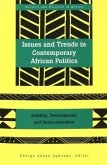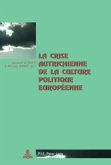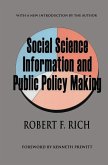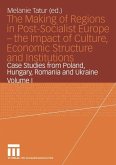In 1990, the signature of the Transatlantic Declaration marked the formal recognition of the European Community as the third main element in the transatlantic institutional architecture, alongside NATO and bilateral relationships. Five years later, US-EU relations took another major step forward with the adoption of a 'New Transatlantic Agenda' (NTA). This volume puts this evolution into historical perspective by identifying the enduring features of the relationship. At the dawn of the Bush administration and in the wake of the Nice Treaty, it also makes a bold attempt at assessing the current state of US-EU relations, notably by taking stock of the changes introduced via the New Transatlantic Agenda. Aimed at practitioners and academics alike, and going well beyond a general overview of transatlantic relations, it first explores the evolution of structures and processes in US-EU relations while paying special attention to the policy-shaping and policy-making strategies of publicand private actors. Focusing on the post-NTA record, it then endeavours to assess, explain and evaluate the policy outcomes of EU-US relations.
Leading authors and practitioners in the field took part in the elaboration of this book:
Maria Green Cowles, Youri Devuyst, Thomas Frellesen, Anthony Gardner, Roy Ginsberg, Alan Henrikson, John Peterson, Alberta Sbragia, René Schwok, Michael Smith.
Leading authors and practitioners in the field took part in the elaboration of this book:
Maria Green Cowles, Youri Devuyst, Thomas Frellesen, Anthony Gardner, Roy Ginsberg, Alan Henrikson, John Peterson, Alberta Sbragia, René Schwok, Michael Smith.
«Ein herausragendes Buch, das nicht aktueller und interessanter sein könnte als zum jetzigen Zeitpunkt.» (World Wide Business)
«Il s'agit d'un fort intéressant ouvrage apportant des informations de qualité sur les acteurs, les objectifs, les résultats des relations entre les Etats-Unis et l'Union européenne.» (Yves-Henri Nouailhat, Journal of European Integration History)
«C'est à l'analyse de cette importante évolution des relations entre les États-Unis et l'Union européenne au cours de la dernière décennie qu'est consacré l'excellent ouvrage publié sous la direction d'Éric Philippart et de Pascaline Winand. [...] Une des premières qualités de ce livre réside dans le fait qu'il réunit quelques-uns des meilleurs spécialistes universitaires du sujet. [...] Il répond a un besoin évident car c'est, à notre connaissance, le premier ouvrage qui, à la fois, analyse systématiquement les structures et les processus décisionnels au coeur du cadre que constitue aujourd'hui le Nouvel agenda transatlantique et offre une évaluation des résultats politiques atteints.» (Philippe Braillard, Etudes internationales)
«[...] the book makes a significant contribution to the literature on transatlantic relations, particularly by clarifying and explaining the actors involved and the policy-making processes and structures that govern those relations.» (Karen E. Smith, London School of Economics and Political Science, London)
«[...] the strength of the book is [...] in the careful empirical analysis and primary research embodied in most of its fourteen chapters, each of which examines a specific aspect or issue-area within the broader transatlantic relationship.» (Mark Pollack, European University Institute, Florence)
«Il s'agit d'un fort intéressant ouvrage apportant des informations de qualité sur les acteurs, les objectifs, les résultats des relations entre les Etats-Unis et l'Union européenne.» (Yves-Henri Nouailhat, Journal of European Integration History)
«C'est à l'analyse de cette importante évolution des relations entre les États-Unis et l'Union européenne au cours de la dernière décennie qu'est consacré l'excellent ouvrage publié sous la direction d'Éric Philippart et de Pascaline Winand. [...] Une des premières qualités de ce livre réside dans le fait qu'il réunit quelques-uns des meilleurs spécialistes universitaires du sujet. [...] Il répond a un besoin évident car c'est, à notre connaissance, le premier ouvrage qui, à la fois, analyse systématiquement les structures et les processus décisionnels au coeur du cadre que constitue aujourd'hui le Nouvel agenda transatlantique et offre une évaluation des résultats politiques atteints.» (Philippe Braillard, Etudes internationales)
«[...] the book makes a significant contribution to the literature on transatlantic relations, particularly by clarifying and explaining the actors involved and the policy-making processes and structures that govern those relations.» (Karen E. Smith, London School of Economics and Political Science, London)
«[...] the strength of the book is [...] in the careful empirical analysis and primary research embodied in most of its fourteen chapters, each of which examines a specific aspect or issue-area within the broader transatlantic relationship.» (Mark Pollack, European University Institute, Florence)








